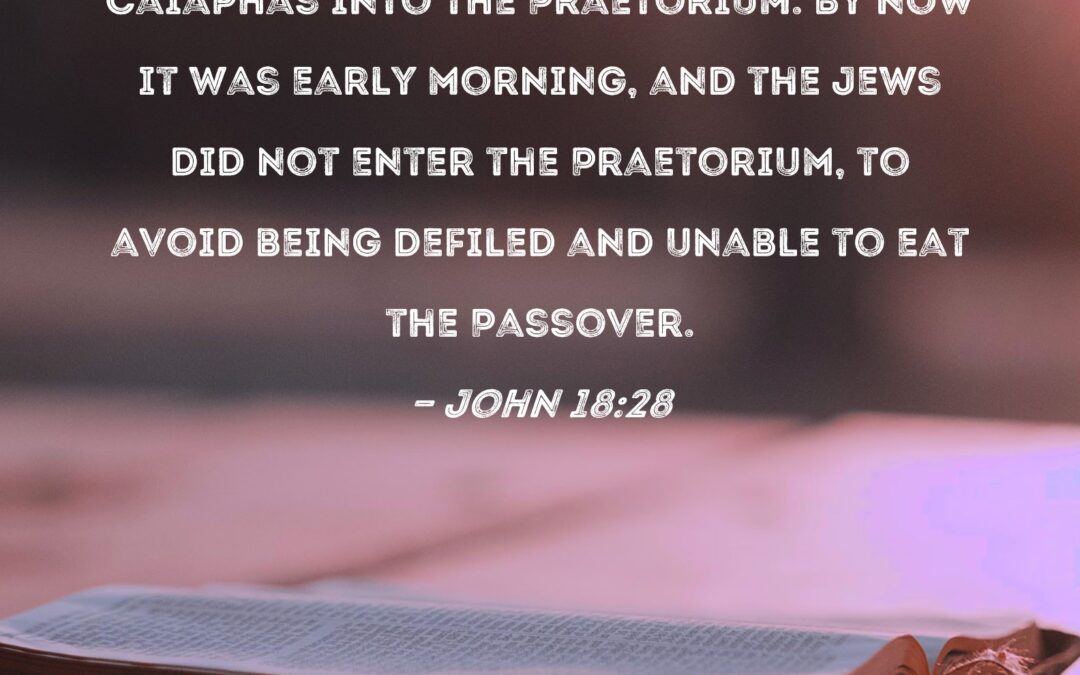There is some difficulty in harmonizing this statement with the timing of events in the other gospels. For instance, Mark and Luke record that Jesus and his disciples already ate the Passover meal the night before, so why did these members of the Sanhedrin not partake of the meal? We know for sure it is Friday since, according to 19:31, as Jesus hangs on the cross, the Jews became concerned that those who were crucified may still be alive well into the Sabbath, which actually begins at sundown on Friday according to Jewish reckoning. This is a significant potential problem because they would not be able to remove the bodies due to Sabbath restrictions. So we can back into the days from there. If Jesus is on the cross throughout the day on Friday, then he ate the Last Supper/ Passover meal on Thursday night with his disciples. Not only does that indicate Jesus and his disciples ate the Passover meal on a different night than some of the rest of the Jews, but it’s also noteworthy that Mark 14:12 and Luke 22:7 refer to the day of the Last supper (Thursday) as the day the lambs were being sacrificed. However, John 19:14 refers to the day of the cross (Friday) as the day of preparation for the Passover, which means that lambs were still being slaughtered for the Passover meal. Both are clearly written and thus both are true. Just think about how the gospels, and especially Matthew and John, would be instantly discredited in the 1st century if they botched the details of the Passover—”How can these guys know anything about the Jewish Messiah if they aren’t even personally aware of the Passover feast?”
In addition to that, we are greatly assisted in our solution to this discrepancy by realizing that in this era of Jewish history, the Passover feast and the week-long feast of Unleavened Bread were interchangeable terms. Due to this fact, along with the vast amount of participants of the feast, the celebration was not limited to a tight period of time. In other words, someone could say they were celebrating the Passover as soon as the week of the Passover began. Perhaps the closest parallel we can relate to is if someone asked you what you did for Christmas. Your answer might not be confined to the daylight hours of Dec. 25th. You could legitimately include what you did on Christmas Eve and maybe even the entire week including Christmas. Some even refer to that as Christmas break or Christmas vacation. You might have even had Christmas dinner on Christmas Eve, the 24th, but no one is going to tell you that doesn’t count as Christmas dinner.
Here is what we can know with certainty—John was very familiar with the Synoptic gospels, which explains why the content of his gospel is approximately 90% different than those accounts. He is not going to contradict their story nor is he going to confuse the details—remember the Scriptures are inspired by the Holy Spirit. Furthermore, it has been clear all along that his gospel account is far more theologically bent, than structured as a tight, chronological report.
Finally, once we arrive at ch.19, it will be apparent why Jesus had to die on the day when the lambs were being sacrificed and the Passover was celebrated. However, that will raise another dilemma because in v.14, John says it was about the 6th hour, which in the other gospels signifies noon. There’s an initial problem with that, because according to Mark’s account, Jesus has already been on the cross since about 9am and then darkness comes upon the land from noon-3pm. It’s possible, but unlikely that John is using a different measurement of time, which would make the 6th hour equivalent to 6am, but it’s even more important to keep in mind that they only kept time in blocks of 3-hour increments, due to trying to visually assess the position of the sun. This is why John says about the 6th hour. Therefore, none of these times are exact in the way we speak about time, but if you want the most precise and chronological, read Mark 15. John is making some theological connections rather than seeking to be extremely technical. The point in John is that, just as we would expect, God’s plan is sovereignly unfolding according to the precise counsel of his will and authority.

